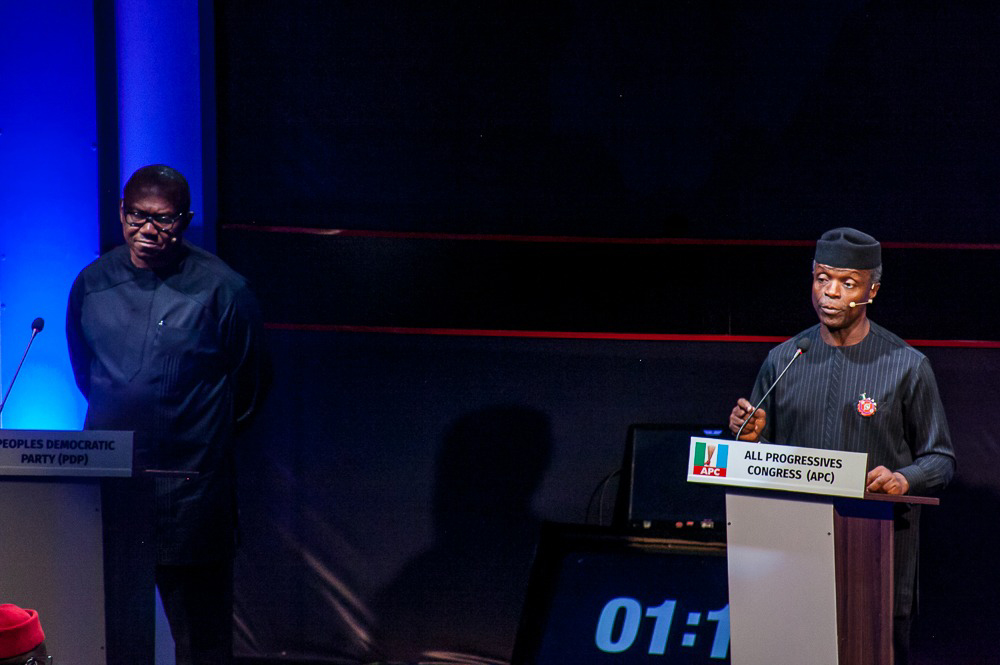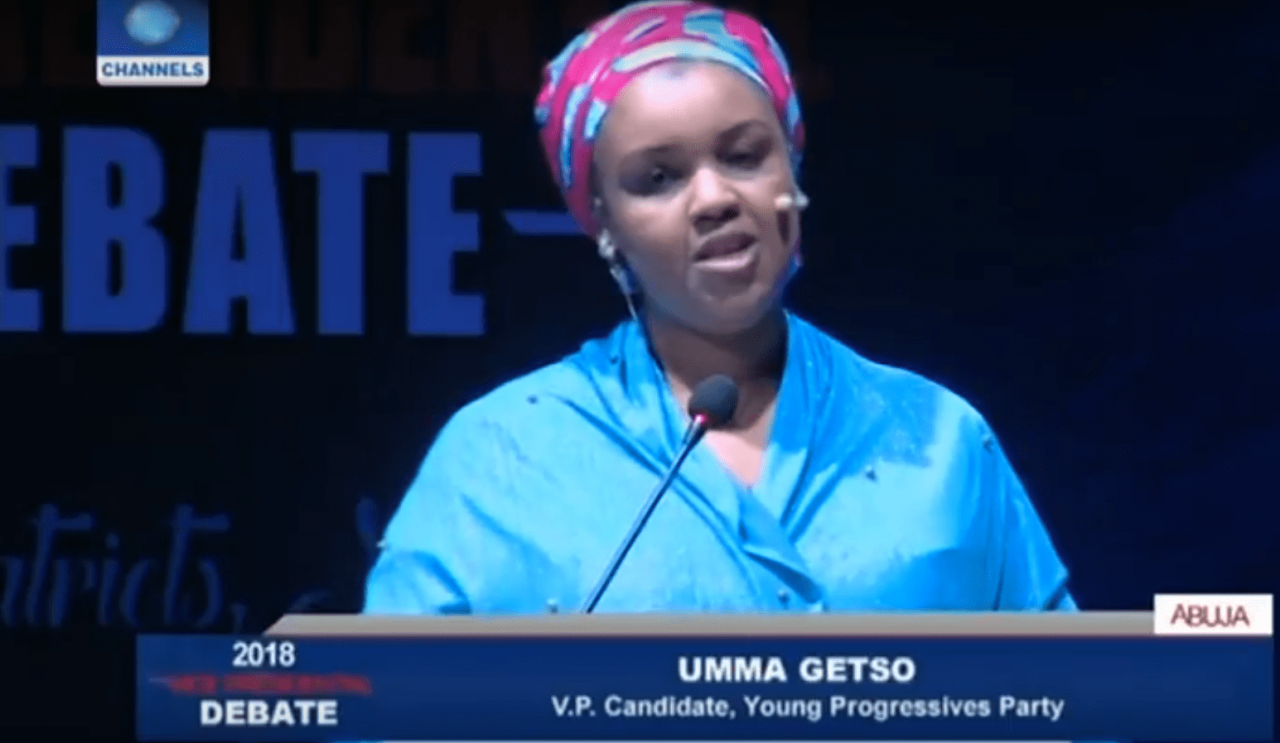Five candidates on Friday slugged it out at the vice-presidential debates organised ahead of the 2019 general elections at the Transcorp Hilton Hotel in Abuja. The candidates were selected by the presidential election debates group and a group of broadcast stations affiliated to the Broadcasting Organisation of Nigeria (BON).
They included vice presidential candidates of the Allied Congress Party of Nigeria (ACPN), Ganiyu Galadima; Alliance for New Nigeria (ANN), Khadijah Abdullahi-Iya; All Progressives Congress (APC), Yemi Osinbajo; Peoples Democratic Party (PDP), Peter Obi and the Young Progressives Party (YPP), Umma Getso (YPP).
Although all five candidates marshalled their points during the debate, candidates of the two major parties – APC and PDP – attracted the most attention Friday night. Some of the candidates also posted their claims on their verified twitter handles after the debate.

Mr Osinbajo of the APC participated in the debate as the running mate to President Muhammadu Buhari, while Mr Obi, a former governor of Anambra State and vice presidential candidate of Atiku Abubakar, stood in for the PDP.
PREMIUM TIMES brings you a fact-check of the claims made by the candidates during the debate.
Peter Obi’s Claims
Claim 1: The federal government spends only N5 on the health of each Nigerian citizen per day.
Verdict: True. PREMIUM TIMES’ independent analysis of the budgetary allocationto the health sector shows that in the 2017 appropriation bill presented by President Buhari last November, N340 billion was allocated to the sector.
It meant that the government spent N1,888 on each citizen for the whole year, translating to approximately N5.2k per day.
Claim 2: Nigeria has the highest numberof out-of-school children in the world.
Verdict: True. A Demographic Health Survey (DHS) said to have been conducted in 2015 by the United Nations Children Fund (UNICEF) and the Nigerian government claimed Nigeria’s population of out of school children has risen from 10.5 million to 13.2 million. Although some have questioned the authenticity of the survey, Nigeria is largely ranked as having the highest number of out of school children in the world.
Claim 3: In arguing that petrol subsidy was a waste of resources, Mr Obi said there are only two million vehicles in Nigeria
Verdict: False. In June, the National Bureau of Statistics (NBS) estimated the total number of vehicles in the country at about 11.7 million with commercial vehicles holding about 58.08 per cent of the number. According to the report, out of the 11,653,871 million vehicles, commercial vehicles are 6,768,756, representing about 58.08 per cent; private are 4,739,939 (40.67 per cent); government vehicles followed with 139,264 (1.19 per cent); while Diplomatic vehicles accounted for 5,912 (0.05 per cent).
Claim 4: Within the same period that #China produced 7 million jobs, Nigeria lost 4 million jobs.
Verdict: Largely true. Although the NBS has not published unemployment report in the last few quarters, the bureau reported in 2017 that no fewer than 4.4 million Nigerians joined the unemployed in the country. The NBS said the percentage of unemployed Nigerians increased from 16.2 per cent in the second quarter of 2017 to 18.8 per cent in the third quarter of the same year.
Claim 5: Nigeria’s foreign direct investment for 2015 was $21bn, while it fell to $12bn in 2017.
Verdict: False. The National Bureau of Statistics (NBS) data showed that the total value of capital importation into Nigeria stood at $9.6 billion in 2015 and $12.3 billion in 2017. In the second quarter (Q2) of 2018, it fell to $5.51 billion. FDI inflows to Africa in 2015 was an estimated $38 billion, down 31 per cent from $54 billion recorded in 2014. Nigeria’s total capital imported stood at $20.7 billion only in 2014 and even that fits not into Mr Obi’s narrative because FDI is just a part of capital importation, often divided into three main investment types: Foreign Direct Investment (FDI), Portfolio Investment and Other Investments, each comprising various sub-categories.
Claim 6: In making his points on Nigeria’s debt profile, Mr Obisaid Nigeria’s debt is unsustainable.
Verdict: Subjective. Although many analysts including Amina Mohammed, UN Secretary-General have expressed worriesover the nation’s debt profile, the government has consistently said all was well with the nation’s debt to GDP ratio. In May, the immediate past finance minister Kemi Adeosun said Nigeria’s debt to GDP ratio was far lower than many other countries of the world.
Claim 7: Mr Obi also claimed that Nigeria has fallen on the global competitive index to 127 from 124
Verdict: False. According to the 2018 World Economic Forum report, Nigeria rose on the index by 10 places, moving from its 2017 spot of 125 to 115.
Yemi Osinbajo’s claims
Claim 1: Nigeria produces 90 per cent of rice consumed
Verdict: Not proven. A PREMIUM TIMES’ fact-check showed in June that although the government has recorded improvements in the local production of rice, its flagship programme is still dogged by a number of setbacks.

According to official Nigeria figures, rice importation from Thailand dropped from 1.23 million metric tonnes in 2014 to 23,192mt as at November 2017. However, rice importation by neighbouring Benin from Thailand recorded an increase from 805,765 metric tonnes in 2015 to 1.6 metric tonnes as of November 2017, according to the Thai Rice Export Association website. Most of the importation into Benin are believed to have been smuggled into Nigeria through the country’s porous land borders.
Claim 2: Government has made efforts to develop Small and Medium Scale Businesses
Verdict: Largely true. The government, for instance, has designed a lower tax rate of 20 per cent applicable to small companies in manufacturing, agriculture and mining within their first five years of business. In April, the federal government also initiated a Start-up programme designed to build entrepreneurial spirit in youths and prepare them toward self-sustaining. The Bank of Industry and Bank of Agriculture also have different programmes lined up for enterprising youth who wish to create jobs and need capital. Many Nigerian youth have however complained of how difficult it is to access many of these initiatives.
Claim 3: Previous governments of the PDP “practically” abandoned Lagos-Ibadan expressway project
Verdict: False. Although a recent report by PREMIUM TIMES showed how the present government is battling with the road amidst poor funding, PREMIUM TIMES can confirmthat previous governments made efforts to rehabilitate the road like the present government is also doing.
In 2013, the Jonathan government flagged up the reconstruction of the highway. The N167 billion project was contracted to Julius Berger Nigeria Plc and Reynolds Construction Company Limited for repairs on Section 1 (Lagos-Sagamu Interchange) and section II (Sagamu Interchange-Ibadan) respectively. Although it was expected to be completed within 48 months, more than 5 years after, (and three years since this government came into power) the road has not been completed.
Claim 4: A bag of fertiliser now sells for N6,000 to N7,000.
Verdict: True. Aside a telephone interview conducted with a farmer Saturday night, PREMIUM TIMES’ checks on Agro Market, an online market for agricultural products, showed that the average price of fertilizer ranged between N6,000 and N7,000.
This was against the higher price of about N10,000 it was sold in the past. The government has deliberately made efforts to reduce market prices.
Other Candidates:
While Mr Obi undoubtedly led in the deployment of figures and statistics to back up his claims, Mr Osinbajo too pushed forward a number of claims using statistics. The other candidates, however, dwelled largely on generalities, many of which may not be subjected to verification. It is, however, important to state that they also made one or two statements backed up with statistics. They include:
Ganiyu Galadima
Claim: None of Nigeria’s four refineries is working
Verdict: False. The NNPC in its latest report for November said the three refineries in Warri, Port Harcourt and Kaduna collectively incurred an operational deficit of N10.79 billion, making them the largest loss-making subsidiaries of the corporation. The report explained further that the refineries’ production in August amounted to 21.51 million litres of petroleum products as against the 38.64 million litres produced in July 2018. This shows clearly that although the refineries do not operate optimally, it is factually incorrect to say none of them works.
Khadijah Abdullahi-Iya
Claim: Multiple taxation affecting Nigerian small businesses
Verdict: Largely true. Many small business owners in Nigeria complain of the multiplicity of taxes from regulatory bodies, local government officials, tax authorities and other bodies.

Umma Gesto
Claim: Nigerian Airways was one of the largest in the world.
Verdict: Untrue. Grossly exaggerated. The Nigeria Airways was founded in 1958 after the dissolution of West African Airways Corporation (WAAC). It held the name WAAC Nigeria until 1971 when it was rebranded to the name it had until it ceased operations in 2003. But it was no way regarded as one of the largest in the world. The biggest airlines today include American Airlines with 1,494 planes; Delta with 1,280 planes; United Airlines with 1,264 planes; Southwest with 683 planes; and FedEx Express with 634 planes. With just about 30 aircraft in its fleet in its heyday, it is untrue to name Nigeria Airways one of the largest airlines in the world as it is in no way among top airlines considered the biggest in the world––even if its ranking is put in the context of its operational status in its heyday.








